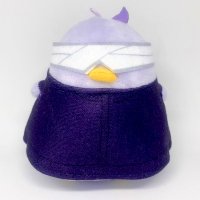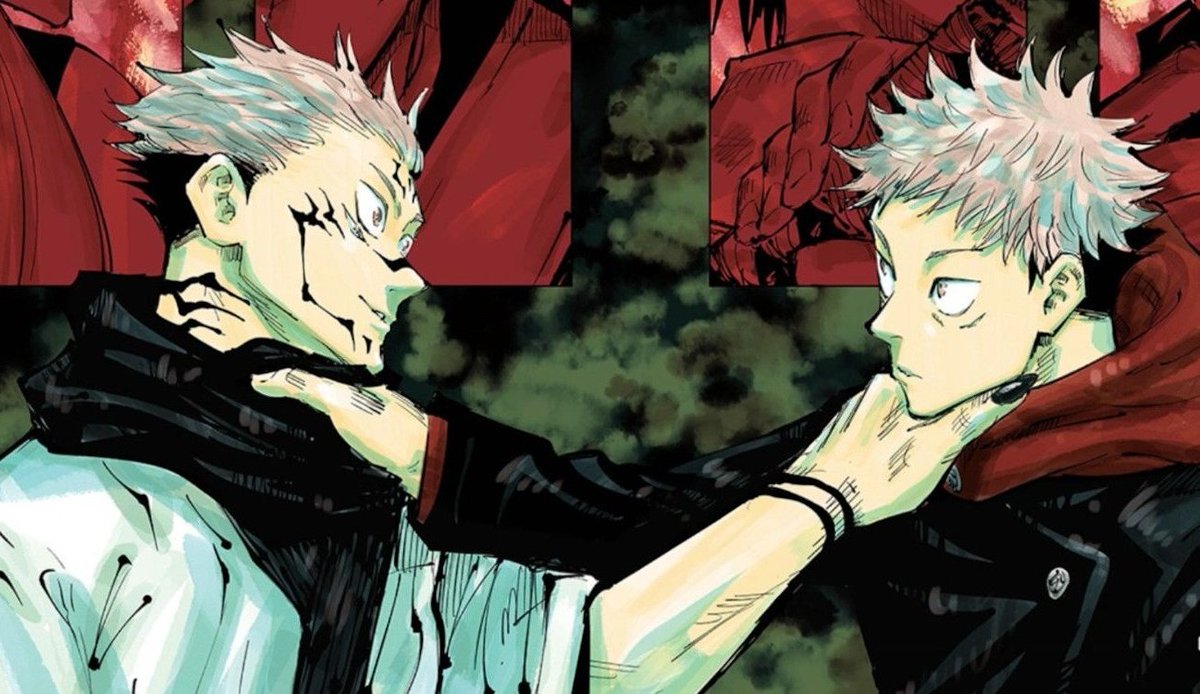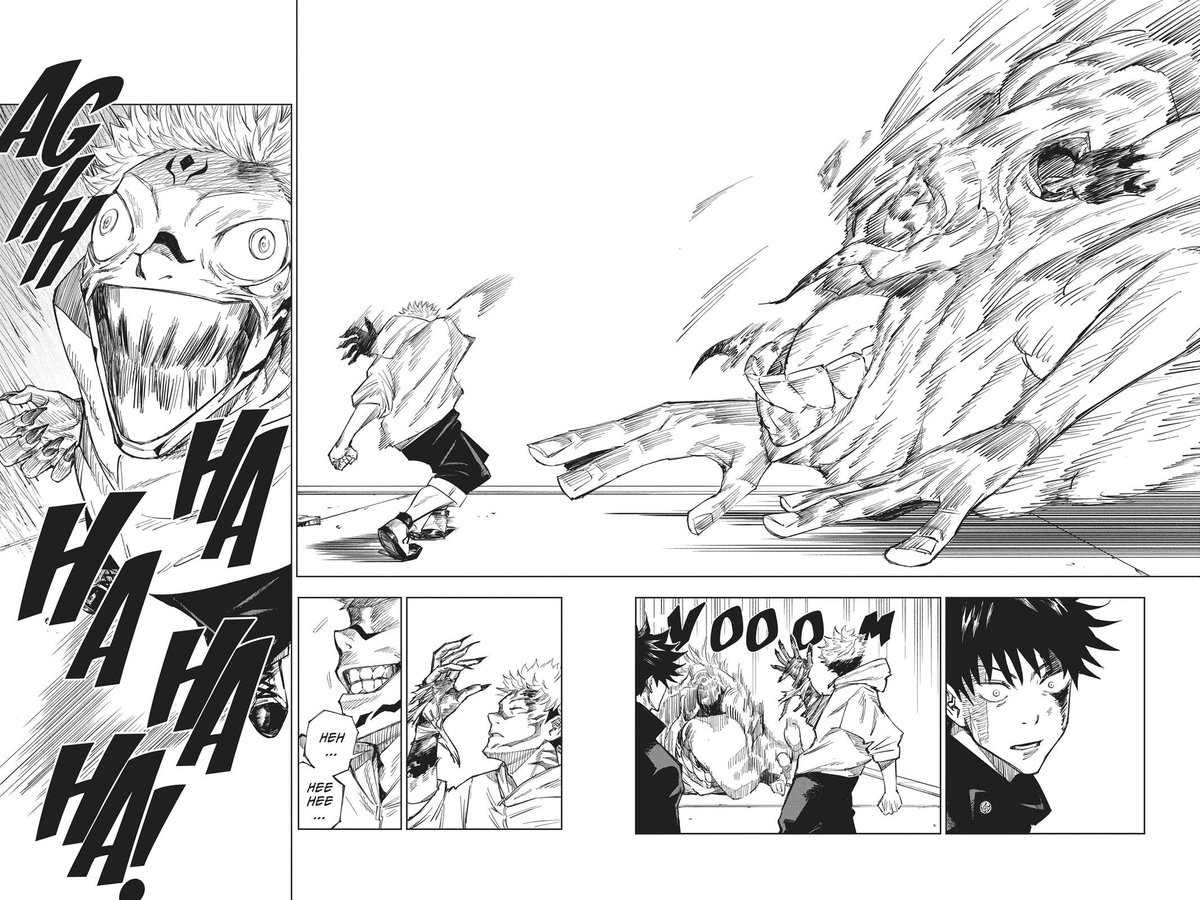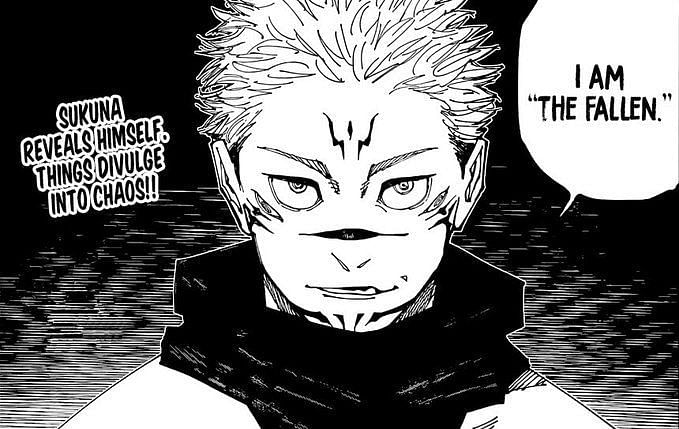
𝐃𝐞𝐭𝐞𝐜𝐭𝐢𝐯𝐞 𝐂𝐫𝐢𝐭𝐢𝐜𝐬@det_critics
Mar 17, 2023
50 tweets
What happens when the very embodiment of hedonism and freedom gets trapped in the body of a teenager?
A more pertinent question: what happens when he then breaks out?
We know what happens, partly at least. Widespread death and destruction.
But I'm not here to reiterate what we already know. I'm here to offer a fresh perspective on Ryomen Sukuna, and how the deliberate construction of his character leads to some of the most interesting dynamics in Jujutsu Kaisen.
There is an interesting pattern of how Sukuna's characterization as an “enlightened” hedonist is done.
Of course, he does whatever he pleases every time he's on panel. But more importantly, the central theme is how his ideals are consistently treated by the story as “correct.”
By which I mean, his ideals are the standard, and any idea conflicting with those ideals are shut down.
There's multiple examples of this; either characters that are in conflict with Sukuna's ideals aren't doing so well rn, or characters unconsciously emulate Sukuna's ideals.
The most obvious instance is Sukuna's concept of strength.
“Disregard everything else, and have an overwhelming sense of self. Anything other than that isn't true strength.”
Gojo didn't have a real sense of self → got locked up.
Yuki worked with Tengen and didn't fight with her own domain → got bisected and had to blow herself up.
Yuji, a cog, fights for a system, and God knows I don't have to mention how much my boy has been beaten down.
On the other hand,
Yuta, for the first time, fought for his own pleasure, and ended up clutching a 3v1. In fact, Sukuna's declaration of his ideals of strength came immediately after that win.
Megumi decided to fight more selfishly against the special grade -
- and made a massive breakthrough in his sorcery by achieving domain expansion, albeit incomplete.
Moreover, the number 1 barrier user in the world and the father of Jujutsu, Tengen's evolved form takes after Sukuna. Whether it was subconscious or not, we don't know.
But it's pretty evident that across the story, whether by design or subconsciously, people align with Sukuna's ideals.
This goes beyond just people too; the beats of the story themselves move so as to align with the idea of Sukuna being the pinnacle.
Sukuna said, “Let me show you what REAL jujutsu looks like,” & introduced us to domain expansions. It has been a staple of the power system ever since.
Sukuna got control over Yuji's body in Shibuya, and set the bar for domains once again with his barrier-less domain expansion.
A character affecting the beats of the story in this manner ties very closely to meta commentary, something Gege Akutami is very consistent with.
Every instance of Sukuna affecting the story or its characters without any influence exerted on his part has meta significance.
Gojo is the pinnacle of the current Jujutsu system, and Tengen is the symbol of the old Jujutsu order. The implications of the both of them being affected by Sukuna from a meta perspective are obvious for the larger story.
Moreover, Yuji is literally only the MC because he was Sukuna's vessel. In fact, at one point, Yuji's entire characterization and construction hinged on Sukuna being contained within him.
Sukuna is what this story is “catching up” to, in a sense.
Essentially, Sukuna is more of an emblem of JJK's themes than a character of his own (or at least, he used to be).
Think about it, why is it that every time we got Sukuna characterization, it was through the lens of some other character?
When he almost cut Mahito in half for touching his soul twice without permission, the iconic line “Throughout heavens and earth, he alone is the honoured one,” was dropped; notably, not by Sukuna himself, but by the narrator.
When Yuji was revealed to be not affected by Kechizu's poison, the reason we were given was that it was because of Sukuna being known as the King of Poisons, and Yuji isn't affected by them by extension. Again, this information was divulged by the narrator.
Very significantly, it was by Gege's orders that no narrator was allowed in the anime. These things I've mentioned were narrated by Nanami and Nobara respectively in JJK Season 1.
Source:
twitter.com/kaikaikitan/st

shiro@kaikaikitan
Jan 21 21
View on Twitter
Interview with Seko Hiroshi (Jujutsu Kaisen Series Composition/Screenplay)
“There’s an order from Akutami-sensei to not use narration for anime production, which is often used in the original work. The narration used in the original work is a unique expression of manga and —
Essentially, the narrator (Gege's voice in the manga) is being treated as just another character's voice, as per his own orders.
This not only adds heavily to the authorial intention behind the meta elements of Sukuna's character, but it also fits how his character has to be -
- extrapolated from another character's biased perspective of Sukuna.
For instance, how do we really know it was Sukuna that gave Yuji his poison immunity and not the fuckery Kenjaku did to make Yuji special?
After all, they said it would take some time for Cleave and Dismantle to be engraved in Yuji's body. Why was the poison immunity given near instantaneously then?
Further, one last example I'll give is the conversation Jogo had with Sukuna.
Sukuna telling volcano man that he's strong is one of the best spread pages in the series, and it may not have been real at all.
Why would Sukuna, who was beating Jogo's ass with just hands and calling him pathetic, tell him he's strong after a firepower battle?
Moreover, the expressions on Sukuna's face are vastly different when you consider the panel where we objectively know he's staring at Jogo's burning corpse vs when he's talking to him.
There are stronger grounds to state that the conversation happened in Jogo's head too.
1. Dagon and Hanami were there.
2. Jogo always sought affirmation of his strength, and him dreaming of getting that from the idol of cursed spirits before his death is very fitting for his character.
Either way, Sukuna's character is explored through Jogo as the lens.
The assertion to derive from whatever I've said so far is that Sukuna as a character adapted to whatever perception any character had of him at that point. Because he literally could not provide us any characterization on his own since he was trapped in Yuji's body.
In fact, that was the point of putting the word enlightened in quotation marks in one of the very first tweets of this thread.
The idea that he's enlightened comes from the iconic "tenjō tenge" line being delivered by the narrator/Nanami, not by Sukuna himself.
Consider how he is based on a Shinto deity of the same name. This piece of information also plays a substantial role in our perception of his enlightenment.
Of course, this is explained by how Gege plays around with the traditional idea of enlightenment. More on this later.
This assertion that he adapts to the perceptions of those viewing him is supported by his very characteristic matrix. One of his abilities, Cleave, literally adapts to his opponents.
Moreover, when he temporarily got control of Yuji's body, the primary threat was Mahoraga.
And what is Mahoraga's special ability? That's right, it's to adapt. It all fits perfectly.
At the risk of getting lost in a tangent, this sequence concretely foreshadows Sukuna's connection to angels as well.
The Cherubim are called the "many-eyed," and, along with the Seraphim, are depicted in flames. This is because of their close proximity to God. His radiant fire is reflected in the depictions of the Seraphim and Cherubim.
Sukuna has many eyes, and he also has flames...
Much to Jogo's surprise. In fact, Sukuna even reasons that a cursed spirit wouldn't know about this, meaning humans, who are privy to Christian lore, would be able to make the connection.
Further, in said lore, angels appear to humans as and how it's necessary.
They can change their forms to *adapt* to whatever the need of the moment may be, since they are ethereal beings.
Sounds like there's a solid connection here, all the more strengthened by Mahoraga's face literally just being two angelic wings.
Not to mention, Sukuna explicitly states he's not going to change back to his four-armed form, because his current form is more suited to fight sorcerers. He has forever been seen adapting to the situation, the reiteration of this concept is almost obsessive.
So far, we've explored Sukuna's character before a certain turning point in the series, which is none other than Sukuna leaving Yuji's body and occupying Megumi's.
Ever since then, we've learned a lot about Sukuna. The difference is that we learn about him FROM HIM.
Actually, just the fact that Sukuna occupied Megumi's body of his own volition says a lot when you juxtapose it with him being trapped in Yuji's body.
Sukuna has finally, completely, regained his agency. And he makes goddamn sure he lets us know that.
Quite literally, in fact.
His little eye seems to be directly looking at the audience, doesnt it? Especially as he's talking about humanity's faults, its like he's addressing us directly.
This is the point which solidifies the meta interpretation of Sukuna's character for me.
It essentially means he's addressing the audience, telling us to know our place and not impose our perceptions on who he really is.
It fits the direction Gege is going with Sukuna's character so well, not to mention Sukuna's attitude itself.
Remember when he told Mahito to "know his place, fool"? The word he used for fool directly translates to "one who does not know anything."
Mahito is described to be the mirror of humanity. Sukuna has forever been addressing humans as a whole telling us we don't know anything.
And that might as well have been the case. Think about how many theories regarding Sukuna have been disproved ever since he regained his agency.
We thought Megumi would summon for him his original 4-armed body. He took over Megumi's body instead.
We thought he'd go back to the 4-armed form as soon as possible when we learned he could always transform. He refused to do it.
We thought the concept of vessels in Sukuna's context was limited to Yuji and few others in history who could host him. And instead...
We find out that Sukuna could have chosen a vessel for himself at any point in time, and people that can resist his will are far more common. In fact, specifically to circumvent this, Sukuna and Uraume have a whole procedure (the Bath) to sink the soul of the vessel into despair.
Ever since Sukuna has regained complete agency, he's actively disproved almost every major theory we've had about him.
This, along with a certain dynamic that this meta interpretation creates for Sukuna, strengthens my assertion.
The only other characters with whom we can extrapolate so much meta storytelling is Maki and Toji, who play the role of escaping the constitutional framework of the series itself, and breaking free of Gege's control by getting rid of all cursed energy in them.
Cursed energy is Gege's form of imposing fate on his characters. The most explicit example is Yuji, who got handed his fate by ingesting a cursed object, i.e. Sukuna himself.
Maki and Toji are explicitly stated to have the ability to break the chains of fate itself.
This is actually its own thread, but these are the basics of the meta interpretation of their characters.
But Sukuna being ingested by Yuji has significance of Sukuna too, since Gege essentially uses him as a tool to create the MC of JJK. Gege exerts control over him this way.
Sukuna shifting to Megumi's body essentially means he's free of Gege's control. Similar to Maki in that sense.
What makes this dynamic interesting is how Sukuna and Maki are the respective embodiments of the clashing ideals between Kenjaku and Yuki Tsukumo.
Sukuna is the ultimate example of what you get when you optimize CE. In fact, Kenjaku models his plans after the revival of the Heian era, when Sukuna ruled as the King of Curses.
Yuki explicitly states she wants to research Maki as an example of away from CE.
This contrast also extends to Maki's portrayal as a true enlightened being vs Sukuna's enlightenment obviously being an imposition of perception, and it further emboldens me to claim that Sukuna has as much characterization from a meta perspective as Maki.
Final point:
In the latest chapter, Sukuna summons Mahoraga. But this time, Mahoraga's wheel, the symbol of perfect adaptability, appears over his head like a halo.
This likely points to Sukuna's newly gained agency; to adapt or not is his privilege.
To wrap up this thread, I believe Sukuna is one of the more overlooked characters in JJK right now in terms of quality of writing, and hope I substantiated that belief in this thread.
Thank you for reading Thank you @J🌞 elden lord(new) @NFMaster🇸🇴🇰🇪🇩🇪🕌 for helping me put this together
Thank you @J🌞 elden lord(new) @NFMaster🇸🇴🇰🇪🇩🇪🕌 for helping me put this together
 Thank you @J🌞 elden lord(new) @NFMaster🇸🇴🇰🇪🇩🇪🕌 for helping me put this together
Thank you @J🌞 elden lord(new) @NFMaster🇸🇴🇰🇪🇩🇪🕌 for helping me put this together

𝐃𝐞𝐭𝐞𝐜𝐭𝐢𝐯𝐞 𝐂𝐫𝐢𝐭𝐢𝐜𝐬
@det_critics
let's destroy each mistake that we made, then restore colour back to the grave
Missing some tweets in this thread? Or failed to load images or videos? You can try to .

































































